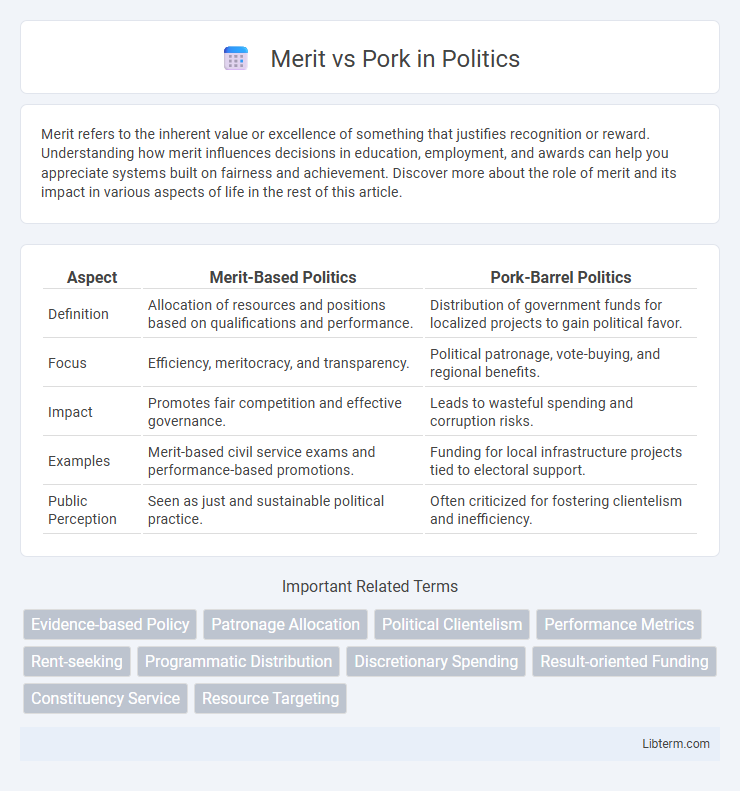Merit refers to the inherent value or excellence of something that justifies recognition or reward. Understanding how merit influences decisions in education, employment, and awards can help you appreciate systems built on fairness and achievement. Discover more about the role of merit and its impact in various aspects of life in the rest of this article.
Table of Comparison
| Aspect | Merit-Based Politics | Pork-Barrel Politics |
|---|---|---|
| Definition | Allocation of resources and positions based on qualifications and performance. | Distribution of government funds for localized projects to gain political favor. |
| Focus | Efficiency, meritocracy, and transparency. | Political patronage, vote-buying, and regional benefits. |
| Impact | Promotes fair competition and effective governance. | Leads to wasteful spending and corruption risks. |
| Examples | Merit-based civil service exams and performance-based promotions. | Funding for local infrastructure projects tied to electoral support. |
| Public Perception | Seen as just and sustainable political practice. | Often criticized for fostering clientelism and inefficiency. |
Understanding Merit-Based Systems
Merit-based systems prioritize performance, skills, and achievements to allocate resources, rewards, or opportunities, ensuring fairness and efficiency in organizations or governments. This approach contrasts with pork-barrel politics, where favoritism and political bargaining drive resource distribution, often leading to inefficiency and corruption. Understanding merit-based systems highlights their role in promoting transparency, accountability, and long-term development.
Defining Pork-Barrel Politics
Pork-barrel politics refers to government spending intended to benefit constituents of a politician in return for their political support, often characterized by localized projects secured through legislative means. Unlike merit-based allocation, which prioritizes funding based on objective criteria such as need or efficiency, pork-barrel spending allocates resources to gain political favor regardless of broader policy effectiveness. This practice can undermine equitable resource distribution and lead to inefficiencies in public projects.
Historical Context: Merit vs Pork
The historical context of merit versus pork in governance reflects competing priorities in resource allocation and political accountability. Merit-based systems emphasize qualifications, performance, and efficiency, originating from civil service reforms like the 19th-century Pendleton Act in the United States. Pork barrel politics, rooted in patronage traditions, involve directing government funds to local projects to secure electoral support, often leading to debates over favoritism and public resource mismanagement.
Benefits of Merit-Driven Approaches
Merit-driven approaches enhance organizational efficiency by promoting talent and competence, leading to higher productivity and innovation. These systems foster a culture of fairness and motivation, reducing favoritism and increasing employee satisfaction. By aligning rewards with performance, merit-based frameworks attract and retain top talent, driving long-term success.
Drawbacks of Pork-Barrel Practices
Pork-barrel practices often result in inefficient allocation of government resources by prioritizing local interests over national priorities, leading to wasteful spending on projects with little broader benefit. These practices can foster corruption and reduce transparency, as funds are distributed based on political favoritism rather than merit-based criteria. Such drawbacks undermine public trust and weaken the overall effectiveness of public policy and development initiatives.
Impact on Public Trust and Governance
Merit-based systems enhance public trust by promoting fairness, transparency, and competence in public service appointments, which strengthens governance effectiveness and accountability. In contrast, pork-barrel politics undermines public trust by fostering nepotism and corruption, resulting in inefficient resource allocation and weakened institutional integrity. Governments emphasizing meritocracy experience higher citizen confidence, improved policy outcomes, and stronger democratic governance structures.
Case Studies: Merit vs Pork in Practice
Case studies examining Merit vs Pork reveal how merit-based systems enhance transparency and efficiency by rewarding genuine achievements, while pork-barrel politics often leads to resource misallocation and corruption. In public infrastructure projects, merit-driven approaches demonstrate improved outcomes through competitive bidding and performance evaluation, contrasting sharply with pork-influenced initiatives that prioritize political favoritism over public need. Examples from regions implementing strict meritocratic policies show higher public trust and sustainable development compared to areas dominated by pork allocation.
Policy Implications and Reforms
Merit-based allocation promotes efficiency, transparency, and fairness in public resource distribution, reducing corruption and fostering economic growth. Pork-barrel spending, driven by political patronage, often misallocates funds, impedes development, and undermines public trust. Policy reforms emphasizing meritocracy include strengthening institutional frameworks, enhancing accountability mechanisms, and implementing performance-based budgeting systems.
Promoting Transparency and Accountability
Merit-based systems prioritize transparency and accountability by ensuring that resources and opportunities are allocated according to qualifications and performance, reducing favoritism and corruption. Pork-barrel politics often obscure decision-making processes, enabling misallocation of funds for personal or political gain without clear accountability. Promoting merit fosters trust in institutions and improves public service delivery by holding officials responsible for objective outcomes.
Future Trends in Public Resource Allocation
Future trends in public resource allocation emphasize merit-based distribution to enhance efficiency and transparency, reducing the prevalence of pork-barrel spending. Advances in data analytics and AI-driven decision-making tools enable governments to target funding toward high-impact projects that demonstrate measurable outcomes. Increasing public demand for accountability is driving reforms that prioritize evidence-based resource allocation over politically motivated expenditures.
Merit Infographic

 libterm.com
libterm.com